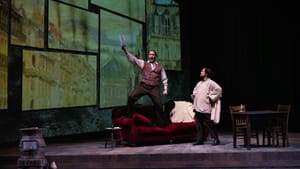Stay in the Loop
BSR publishes on a weekly schedule, with an email newsletter every Wednesday and Thursday morning. There’s no paywall, and subscribing is always free.
Oh, for the cheap seats
Opera Philadelphia presents ‘La Bohème’

Opera Philadelphia’s season-ending revival of La Bohème stands as a testament to the quality of musical education in this city. Three of the four principal soloists received their training at the Academy of Vocal Arts (AVA) or the Curtis Institute, and together, they form one of the strongest quartets I’ve ever heard in this piece. Puccini’s classic love story works best with young singers whose interpretations of these familiar roles haven’t calcified, and to a person, the central cast bring a pleasant, sprightly energy to the assignment.
Vivid, daring performances
Take, for example, tenor Evan LeRoy Johnson, who combines ardent lyricism and spirited acting in his vivid performance as Rodolfo, the dreamy poet who burns his manuscripts to keep warm and woos the waiflike Mimi with tales of his tortured artistry. Surely others have sung the role as well or better, but as Johnson’s butter-smooth legato streamed out into the Academy of Music, I searched in vain to recall anyone who made me believe the character’s passion so fully.
Vanessa Vasquez matched him vocally and dramatically. Her conception of Mimi was less frail and more forthright than some might be used to—when she decides to leave Rodolfo in the third act, she seems anguished but totally invested in the correctness of her choice. It’s a smart, daring interpretation, complemented by a healthy dose of musical intelligence. Though US-born, her shimmery soprano reminded me of the timbre often associated with Romanian singers, with exquisite morbidezza and a hint of steel beneath the softness.
Johnson and Vasquez have impressed in past performances at their respective conservatories (Curtis for him, AVA for her); Johnson further distinguished himself last season as Don José in Opera Philadelphia’s Carmen. Their work here confirms that great things are in store for both.
Real stage chops
The same could be said of Ashley Marie Robillard, who makes a delectable Musetta. She delivers her character’s signature aria “Quando m’en vo” with coquettish charm, but she doesn’t rely on the stock gestures one often sees in this role—no batted eyelashes, no little-girl flounces, just solid singing and real stage chops. And as the role gains in complexity in the second and third acts, Robillard turns soulful—Musetta’s final, almost whispered prayer in Act Four emerges so delicately here it almost sounds whispered.
Troy Cook may not have gone to school in Philly, but he’s a familiar figure thanks to regular engagements with the opera company. He sings Marcello, Rodolfo’s roommate and Musetta’s sometimes-lover, with gravitas and humor, and his bell-clear Italian diction could serve as a model for young performers to follow.

Injustice to the voices
If music were all, these four would deliver the highlight of the classical season. But opera is theater, and the performers need a production that equals their fine efforts. Unfortunately, Davide Livermore’s garish 2012 staging—directed here by Alessandra Premoli—undercuts their achievements at almost every turn.
Because Marcello is a painter, Livermore (who also designed the sets and costumes) took the canon of Impressionist artwork as his canvas; throughout the performance, images by Cézanne, Renoir, Van Gogh, and others adorn the walls of the set, in projections designed by the Italian visual arts firm D-Wok. We are supposed to believe that Marcello is creating the paintings himself, in real time, but the ultimate effect feels like you’re staring at someone’s screensaver.
The gauche gimmick proves needlessly distracting. Instead of focusing on Mimi’s anguish in Act Three, as she grows progressively sicker and harbors growing guilt over the pain she causes Rodolfo, the audience oohs and ahhs at the bare, swaying Pissarro trees in the background. And in the final act, the towering image of Jean Béraud’s After the Misdeed positively dwarfs Vasquez, costumed as the now-dying Mimi to resemble the central figure in that painting.
It also makes little sense—Marcello isn’t even the central figure of the opera—and adds even less to the experience in execution. Still, one wanted to focus on the positive elements, which included music director Corrado Rovaris’s brisk reading of the score and the hefty-voiced bass Peixin Chen, who sang Colline’s coat aria with great style. On the other hand, Kevin Burdette’s tacky acting and turpentine-thin voice in the comprimario roles of Benoit and Alcindoro perfectly suited the vulgar atmosphere.
The view from the top
As a critic, I’m bound by duty (and professional standards) to see a performance through to the bitter end. Still, I found myself tempted to bolt during both of the overlong, unnecessary intermissions. It was only the extraordinary musical virtues of the four leading singers that kept me in my seat.
Another thought crossed my mind along the way: The Academy of Music famously has hundreds of obstructed-view seats in the upper tiers, where structural columns partially or fully obscure the stage. I came close to bounding upstairs and offering some poor student my prime orchestra seat in exchange for their undesirable sightlines.
So here’s my bit of consumer advice—buy the cheapest seats you can for this Bohème, where you can hear the music in all its glory without having to suffer the uncouth antics onstage.
What, When, Where
La Bohème. By Giacomo Puccini, Luigi Illica, and Giuseppe Giacosa. Production by Davide Livermore; directed by Alessandra Premoli. Opera Philadelphia. Through May 5, 2019, at the Academy of Music, 240 S. Broad Street, Philadelphia. (215) 732-8400 or operaphila.org.
The Academy of Music is an ADA-compliant venue. To purchase accessible seating for Opera Philadelphia performances at the Academy, call (215) 893-1999.
Sign up for our newsletter
All of the week's new articles, all in one place. Sign up for the free weekly BSR newsletters, and don't miss a conversation.

 Cameron Kelsall
Cameron Kelsall